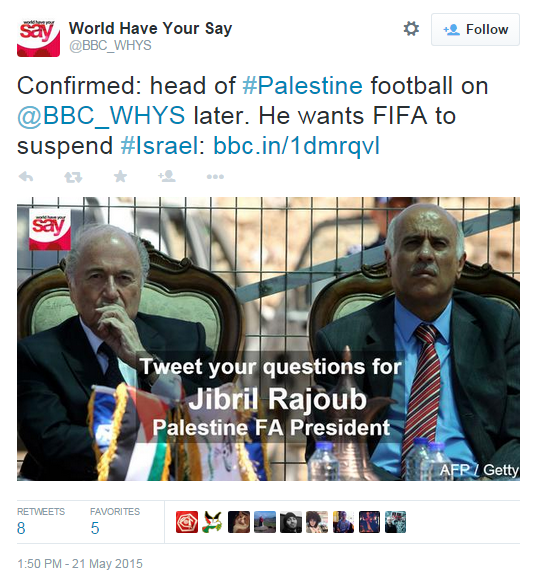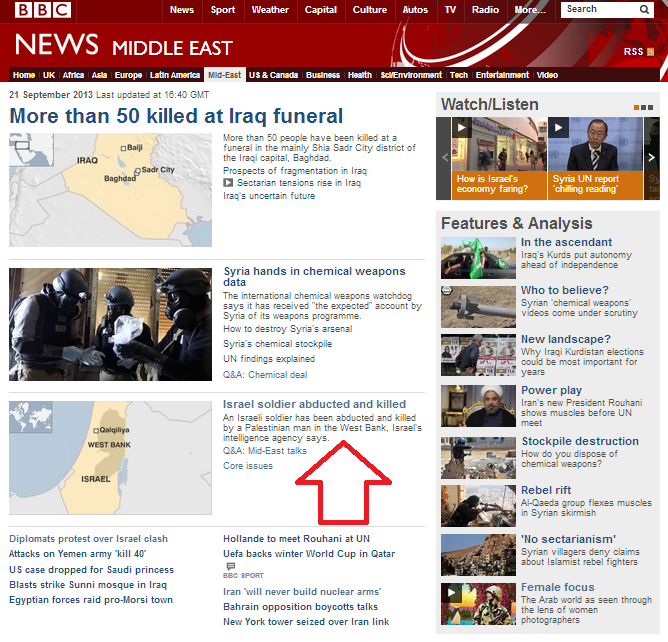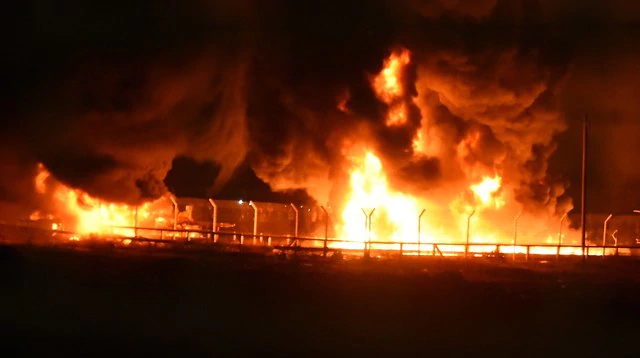It is interesting to note that BBC coverage of the end of the current round of negotiations between Israel and the PLO – which were defined even before their commencement as coming to an end on April 29th 2014 – has come almost exclusively in the form of reports produced by its Middle East Editor Jeremy Bowen.
Those reports – whether filmed, written or audio – are hallmarked by repeated promotion of a number of specific themes which are clearly the points intended to be taken away by BBC audiences.
Bowen’s messaging includes portrayal of the Arab-Israeli conflict as an exclusively Palestinian-Israeli affair and as one concerning land only, as well as the claim that the opportunity for a two-state solution to the conflict died with this latest round of negotiations (the end of which, significantly, had been attributed to Israel alone in previous BBC reports) and the prediction of violence in the near future.
On April 29th Bowen produced another filmed report which was broadcast on BBC television news programmes as well as being promoted on the Middle East page of the BBC News website under the title “Mid-East talks: Is two-state solution beyond reach?“. That report joined a previous filmed report aired earlier in the day and an audio report broadcast on BBC Radio 4.
Bowen opens that report with repetitions of most of his main messaging points.
“Jerusalem has been fought over since people first settled here six thousand years ago. For more than twenty years, off and on, Palestinians and Israelis have negotiated peace. Life didn’t stand still. Optimism gave way to despair and then to cynicism. Now it’s hard to find Palestinians or Israelis who care much about the latest negotiating failure; there have been too many of them. The last round of peace talks collapsed with Palestinians and Israelis blaming each other and President Obama blaming both of them. Since the peace process first started more than twenty years ago, it’s been about trying to create a Palestinian state alongside Israel so they divide the land that they fought over. More than two decades on, a state and peace seem as far away as ever. So perhaps the time has come to accept that the two-state solution isn’t going to happen.”
Once again, Bowen leaves the broader issue of the Arab-Israeli conflict out of the frame. Considering that a number of the stances adopted by the PLO during the last nine months of negotiations have had public backing from the Arab League (including the refusal to agree to security arrangements in the Jordan Valley and the all-important issue of recognition of Israel as the Jewish state), the broader picture is obviously context which BBC audiences need in order to fully understand the subject.
Notably too, Bowen continues to describe the failure of past peace-making efforts in opaque and overly generalised terms. From the Arab League refusal to accept the 1947 Partition Plan, through the ‘three noes’ of Khartoum and the PA’s decision to start the second Intifada and right up to the Palestinian Authority’s refusal to accept several potential plans over the last twenty years or so, Bowen refrains from providing audiences with the vital background which forms the foundations of the story upon which he is now reporting.
His framing of history is no less selective: once again Bowen’s version of Middle East history begins in 1967 and thus denies audiences the ability to comprehend that the conflict in fact is rooted in events long before the Six Day War. He continues:
“Israel has occupied the West Bank, including East Jerusalem, since the 1967 war. After Jerusalem the most contested city is Hebron; the burial place of the prophet Abraham. Behind heavy security, a small number of Jewish settlers live right next to more than 150,000 Palestinians.”
As was the case in his previous filmed report from Hebron from the same date, Bowen makes no attempt to inform audiences of the essential context of the 1997 Hebron Protocols; the agreement signed between Israel and the Palestinian Authority which is the basis for the Israeli presence in the H2 area of Hebron. He goes on:
“Shlomo Levinger’s father led the first Jewish settlers back to Hebron in 1967.” [emphasis added]
However, Bowen refrains from clarifying to audiences what “back to Hebron” actually means and – despite obviously being aware of the history – conforms to the usual BBC practice of refraining from mentioning the subject of the existence of Jewish communities in areas of Judea & Samaria and Jerusalem later conquered by Jordan in the 1948 war. He continues:
“Shlomo believes God wants Jews to live in Hebron and he’s raising seven children here. Peace talks are, at best, an irritant.”
The film then cuts to Shlomo Levinger speaking in Hebrew, with a voice-over in English.
“I don’t think talks will go anywhere. For close to twenty years the State of Israel has been giving and giving and giving. I don’t believe in it. I think the reality for Jews in Hebron is like the reality for Israel in the Middle East. The Arabs would be more comfortable if we didn’t exist.”
In fact, in his final sentence Levinger says in Hebrew “It would be more comfortable for the Arabs if the State of Israel did not exist.”
Against a context-free background of footage of unexplained scuffles between unidentified women and members of the security forces in an unidentified place, Bowen goes on:
“Palestinians and Israelis say they want peace, but when you cross the line from one side to another, you realize that their views of what peace should look like are very different. And, in the absence of peace, mutual hatred – never far below the surface – is boiling up again.”
The report continues with Bowen saying:
“This house in Jerusalem was bulldozed last summer after the Israeli authorities ruled that it was built illegally. For a while its Palestinian owner Khaled al Zeer lived with his family in this damp cave. He stayed on to protest. Now he’s been served papers saying that the lean-to he built in the cave’s entrance must also be demolished.”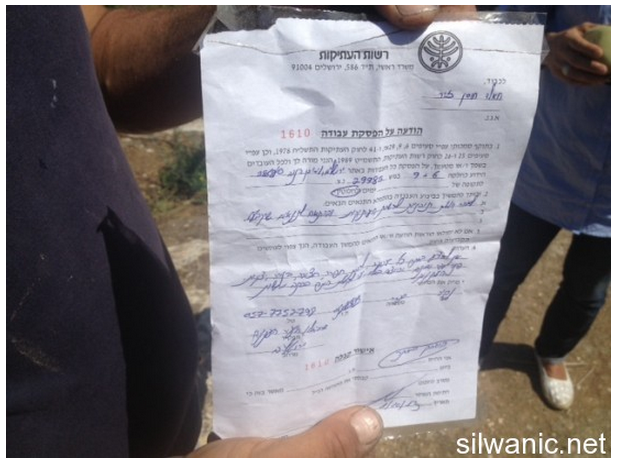
The same cave also appeared in a previous filmed report by Bowen, but there the man involved was not identified. Indeed, the tin structure constructed in Silwan without planning permission by Khaled al Zeer was demolished in August 2013 – exactly as would be any illegal structure anywhere in the world, especially one put up in an area designated by planning authorities as a park. And indeed al Zeer has been informed by the Israel Antiquities Authority (with the backing of a court of law) that he must stop what he claims is ‘renovation work’ on the cave in Silwan in which he decided to squat. Bowen however neglects to inform audiences that many caves in Silwan are not just common or garden caves, but burial caves dating from the Iron Age, so building a “lean-to” there is something akin to bolting planks to Stonehenge.
Interestingly, the publicity-loving Mr al Zeer’s story has been extensively, if subjectively, promoted by the Wadi Hilweh Information Centre – the director of which Bowen interviewed in a previous audio item, without full disclosure of his associations. It is not therefore unreasonable to enquire whether Bowen’s extensive use and amplification of this half-told ‘Palestinian man and a cave’ story was facilitated by the politically partisan Wadi Hilweh Information Centre – an organization which is part of the Silwan Popular Committees and has links to a foreign organization which in turn is linked to the International Solidarity Movement.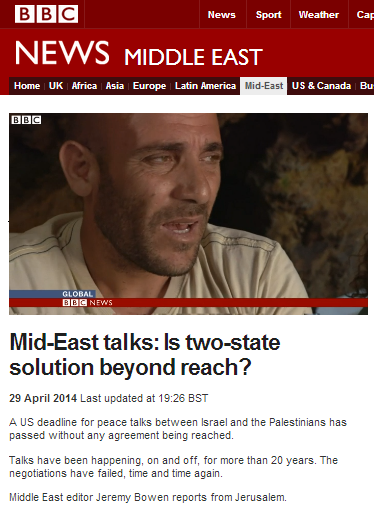
Khaled al Zeer’s history of brushes with the law includes not only illegal construction. One judge described him thus in 2011: “Before us is a man who has a criminal past in offences of violence, property and drugs”. Nevertheless, Jeremy Bowen apparently considers Mr al Zeer a commentator whose opinions on geo-political events are worth amplification to BBC audiences around the world and so the next section of Bowen’s report is devoted to a monologue from al Zeer:
“The negotiations are a big illusion. They didn’t achieve anything and they won’t because the Israelis are using negotiations as a cover to establish more settlements and to confiscate more land from Palestinians. The negotiations are a waste of time. They don’t want any Arabs or Muslims here.”
Bowen concludes by reiterating some of his set messages.
“Peace talks started because two peoples went to war over the same piece of land. They’ve helped manage the conflict but haven’t stopped it. Tension is rising. Another perfect sunset over the Holy City cannot disguise a stormy future.”
Once again we see that by leaving the story of the end of the latest round of negotiations exclusively in the hands of Jeremy Bowen, the BBC is denying audiences any other viewpoint than that promoted by Bowen in his subjective and repeated messaging.

